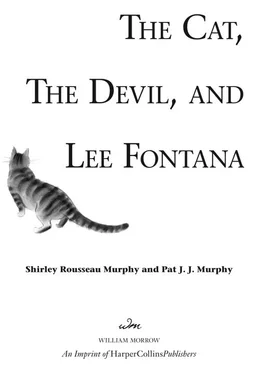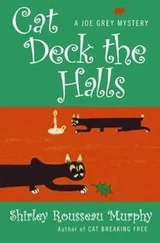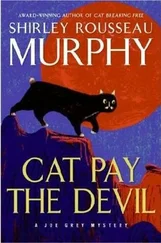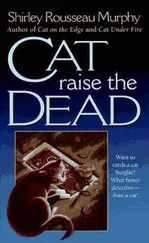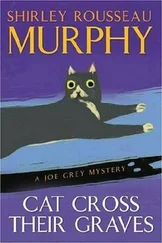Shirley Murphy - The Cat, the Devil, and Lee Fontana
Здесь есть возможность читать онлайн «Shirley Murphy - The Cat, the Devil, and Lee Fontana» весь текст электронной книги совершенно бесплатно (целиком полную версию без сокращений). В некоторых случаях можно слушать аудио, скачать через торрент в формате fb2 и присутствует краткое содержание. Год выпуска: 2014, Издательство: HarperCollins, Жанр: Старинная литература, на английском языке. Описание произведения, (предисловие) а так же отзывы посетителей доступны на портале библиотеки ЛибКат.
- Название:The Cat, the Devil, and Lee Fontana
- Автор:
- Издательство:HarperCollins
- Жанр:
- Год:2014
- ISBN:нет данных
- Рейтинг книги:5 / 5. Голосов: 1
-
Избранное:Добавить в избранное
- Отзывы:
-
Ваша оценка:
- 100
- 1
- 2
- 3
- 4
- 5
The Cat, the Devil, and Lee Fontana: краткое содержание, описание и аннотация
Предлагаем к чтению аннотацию, описание, краткое содержание или предисловие (зависит от того, что написал сам автор книги «The Cat, the Devil, and Lee Fontana»). Если вы не нашли необходимую информацию о книге — напишите в комментариях, мы постараемся отыскать её.
The Cat, the Devil, and Lee Fontana — читать онлайн бесплатно полную книгу (весь текст) целиком
Ниже представлен текст книги, разбитый по страницам. Система сохранения места последней прочитанной страницы, позволяет с удобством читать онлайн бесплатно книгу «The Cat, the Devil, and Lee Fontana», без необходимости каждый раз заново искать на чём Вы остановились. Поставьте закладку, и сможете в любой момент перейти на страницу, на которой закончили чтение.
Интервал:
Закладка:
But was her life any better with Jake? What had Jake given her, that Lee couldn’t have if he’d settled down, if he’d abandoned his footloose drifting, as Jake had? Jake was ranch foreman, he made a good living, they had a nice house, saddle horses, he drove a new truck, and he’d written to Lee that Lucita had help in the kitchen, help with the housework when she wanted it.
Lee could have given her that, if he’d settled down and changed his ways. If he hadn’t been so hotheaded, so hardheaded in what he thought he wanted. The train strained harder hauling up toward the summit, the apple orchards behind and below him now, down on the flats, but he could still smell their sweet scent on the fitful breeze that twisted up the mountain. Just at the top, the engine paused, the train hung there a moment and then heaved itself over, gathering speed until its tail of cars thundered down again, fast. All the green was left behind now. Ahead, down the mountain, the vast desert stretched away, a flat table of pale dry sand and raw rock, parched and faded where no water could reach it.
But then far ahead a line appeared sharply dividing the land: on the near side, the flat pale desert. Far beyond, a vast green garden of lush farm crops, brilliant green, melons, vegetables, the feathery green of date groves, hundreds of acres divided by the concrete aqueducts that carried water from the Colorado, water as precious as gold to bring alive the fields that fed half the state and more, some folks said—water the farmers fought over, their battles growing ever more violent. Water rights meant money, big money, inviting every legal and political grab, every scam a man could imagine.
When gusts of hot wind began to swirl up from the desert, spewing sand in Lee’s face, he returned to his seat. Already the car was growing hot; it grew hotter still as they approached Indio. Off against the mountains he could see what must be Palm Springs, a little resort town patched onto the desert, its tall hedges and high rock walls hiding large vacation homes, he could see just their sprawling rooftops, and flashes of blue that would be swimming pools, oases for the rich. Beyond Palm Springs rose the dry mountains, their peaks incongruously capped with white, with snow that would remain all year, aloof and cold, high above the burning desert.
It was well past noon when the train pounded into Indio, the altered rhythm woke him, the train’s slowing pace, the clang of metal on metal as they bucked over the crisscross tracks, then row after row of dusty freight cars. The temperature, by the big thermometer above the station platform, was a hundred and ten. Facing an hour layover, tired of stale sandwiches and of the stale smell of old food and sweaty passengers, Lee rose. Hanging on to the overhead rail, he followed the conductor, heading for the door. When they pulled up in the center of town he swung off the train, stood waiting to cross the fast highway that served as Indio’s main street. Farm trucks loaded with baled hay and crated produce roared past him farting the smell of diesel. Across the highway an irrigation ditch seethed with fast-running water from the Colorado. Beyond this was a line of shops, a few restaurants, a couple of pawnshops. A reefer truck was pulled over to the side idling, the driver hammer-thumping its tires checking the air pressure that built up in the hot desert. In the bed of a rusted pickup, four migrant workers sat eating bread from torn wrappers. A stalled station wagon sat blowing steam from its radiator, two mattresses tied to its roof, its interior crowded with smear-faced little kids. Diesel fumes from the trucks started him coughing, and when he tried to cross the highway between them he misjudged his distance and had to leap back.
It took him three false starts before he got across, running. He followed the winking neon of taverns and hamburger joints, and soon enough could smell the garlic and hot sauces of a Mexican café. He followed the aroma down a side street until he saw ahead a splash of red and green neon announcing the Colima Café; the smell drew him like a kiss. Hurrying toward the small white house, he pushed inside.
Red checkered oilcloth covered the tables. The fly-specked walls were decorated with sombreros, faded piñatas, and beer posters. The hot, meaty, spicy smell made him think he’d stepped into heaven. He chose a small table, sat with his back to the wall, fingering the sauce-spotted menu, though he knew what he wanted. He sat holding the menu before him, surveying the room.
A man and woman sat two tables down: tourists, all dressed up. Three Mexican men in denim overalls occupied the table in the middle of the room, drinking beer and wolfing tacos from a heaped plate. At a table near the window were two young husky Mexican men dressed in flared jeans, tight T-shirts, and expensive boots, a dozen empty beer bottles on the table between them. Each had several self-inflicted tattoos on his arms, crosses and initials, the kind the peacock punks in the joint gave themselves with the help of a sharp instrument and blue ink. Lee tucked the scene away as he watched the waiter approach wiping his hands on his dirty apron. He ordered chorizo, two eggs over easy, tortillas, refried beans, and a bottle of beer.
The waiter grinned. “You miss breakfast, señor?”
Lee smiled back at him. “I missed this kind of breakfast.”
“¿Qué clase cerveza, señor?”
“Carta Blanca. Pronto, yo tengo sed.”
The waiter scurried for the kitchen, he was back at once with the beer. Lee tilted the bottle and let the icy brew slide down, then ordered another. The ferment they made in prison, from prunes and apricots pilfered from the kitchen, faded into welcome oblivion. When his meal came he covered it with salsa and savored it, too, trying to eat slowly and get the most from every bite, but too soon it was gone. He wrapped the remains of his beans and chorizo in the last fresh, hot tortilla. When finally he pushed back his chair and fished in his watch pocket for money, the two twenties and the five came out together. Annoyed, he peeled off the five and pushed the twenties back, but one of the Mexican boys tapped the other on the shoulder, watching him. Lee paid the bill and left quickly, knowing too well what was coming.
He was barely out the door when he heard it close a second time, and one of the young men shouted, “Hey, hombre viejo . Wait up.”
Lee turned to face them on the empty side street. The two approached him side by side, walking with a belligerent swing through the green river of neon, the taller one casually tossing a small object hand to hand, and Lee caught the gleam of a switchblade. The young man’s voice was soft, casual, and sure of himself. And they were on him, moving in close. “We want the money in that little pocket of yours, señor.”
Lee smiled.
“If you do not give it to us, old man, I’ll show you what this can do.” Again he tossed the knife, watching Lee.
Lee judged his timing and distance. When the knife was in midair he stepped forward on his left foot, did a snap-kick that brought the toe of his right boot crashing into the guy’s testicles. As the young man doubled over, grabbing himself, Lee dropped to a crouch and scooped up the fallen knife. He hit the button releasing the six-inch blade, swung it up in an arc at the man on his left. The blade traveled horizontally, hitting him just below the belt buckle to deliver a gut gash. Bright red blood splashed up across his white T-shirt and down the tight flared pants. The young Mexican looked down, gasped at what he saw, clutched his gut, and fled.
Lee knelt beside the fallen youth. He was curled up groaning, holding his crotch. Lee rolled the boy over, wiped the blood from the knife onto the boy’s nose. “Old man, am I? If I ever see you again, you little pussy-ball scumbag, I’ll cut your nuts off and cram them down your throat.” He closed the switchblade, stuck it in his back pocket, stood up and headed for the train station.
Читать дальшеИнтервал:
Закладка:
Похожие книги на «The Cat, the Devil, and Lee Fontana»
Представляем Вашему вниманию похожие книги на «The Cat, the Devil, and Lee Fontana» списком для выбора. Мы отобрали схожую по названию и смыслу литературу в надежде предоставить читателям больше вариантов отыскать новые, интересные, ещё непрочитанные произведения.
Обсуждение, отзывы о книге «The Cat, the Devil, and Lee Fontana» и просто собственные мнения читателей. Оставьте ваши комментарии, напишите, что Вы думаете о произведении, его смысле или главных героях. Укажите что конкретно понравилось, а что нет, и почему Вы так считаете.
